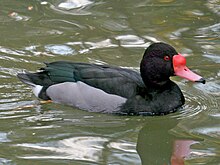| Rosy-billed pochard | |
|---|---|

| |

| |
| Male above, female below | |
| Scientific classification | |
| Domain: | Eukaryota |
| Kingdom: | Animalia |
| Phylum: | Chordata |
| Class: | Aves |
| Order: | Anseriformes |
| Family: | Anatidae |
| Genus: | Netta |
| Species: | N. peposaca
|
| Binomial name | |
| Netta peposaca (Vieillot, 1816)
| |

| |
| Synonyms | |
|
Metopiana peposaca Vieillot, 1816 | |
The rosy-billed pochard (Netta peposaca), alternatively named rosybill or rosybill pochard, is a member of family Anatidae. Though classified as a diving duck, this pochard feeds more like a dabbling duck feeding on seeds roots, sedges, aquatic plants and other grasses.[2][3] Netta is Ancient Greek for "duck" and peposaca is a transcription of the Guaraní name of this species which means "showy wings", referring to the broad white stripe that is only visible with stretched out wings. Male characteristic features include a bright red bill with a rounded knob at the base.
The rosy-billed pochard is endemic to South America. It is found in Argentina, central Chile, Paraguay, Uruguay and southern Brazil. The population in southern Argentina migrates northward during the austral winter, reaching Brazil and southern Bolivia. It is a vagrant to the Falkland Islands.[4]
- ^ BirdLife International (2016). "Netta peposaca". IUCN Red List of Threatened Species. 2016: e.T22680351A92856953. doi:10.2305/IUCN.UK.2016-3.RLTS.T22680351A92856953.en. Retrieved 11 November 2021.
- ^ "Rosy-billed pochard". Dallas World Aquarium. Retrieved 2019-10-12.
- ^ Olguín, Attademo, Beltzer, Virgolini, Lorenzón, Caselli, Acre & Percara (February 2014). "Composition of the diet of Netta peposaca (Birds: Anseriformes) in Santa Fe province, Argentina" (PDF). Zoologia. 31: 97–100. doi:10.1590/S1984-46702014000100011.
{{cite journal}}: CS1 maint: multiple names: authors list (link) - ^ Wildlife Information: Netta peposaca Archived 2008-10-26 at the Wayback Machine
